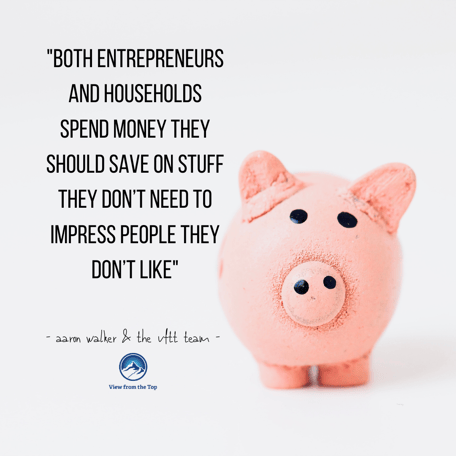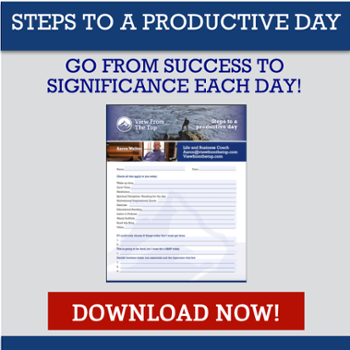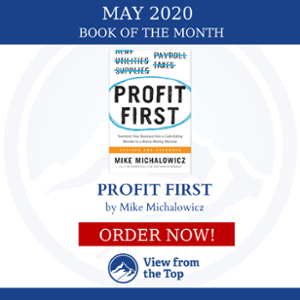You might think I had an easy time developing a plan for wealth. I spent two decades of my life in mastermind groups with Dave Ramsey. That guy knows how to steer people into financial freedom better than anyone.
Well, nobody knows better than me how quickly some things can change. When this coronavirus panic hit, I lost a fortune in the stock market. I’m relieved this is happening at this stage of my life. But I’m equally concerned about others who aren’t so fortunate.
If I were to characterize my financial history, I don’t recall hurting for cash from my early twenties onward. But I do regret a far less purposeful and profit-centered approach to handling success.
We encourage our online mastermind groups to read and implement the book Profit First, by author Mike Michalowicz. I learned about it through Scott Beebe, one of my business coaches and a group facilitator. After reading it, I finally saw the missing piece of a puzzle I’d failed to solve for decades.
What Shall It Profit a Man?
You see, it’s not difficult for entrepreneurs to hear good-sounding news from their accountants in the spring. On paper, posting a profit is what many of them do. According to the Corporate Finance Institute, a margin of 10 percent is average, while five percent or less is considered “poor” and 20 percent or more is considered “excellent.” But their definition of profit is different from ours.
Michalowicz adds that most CPAs consider you “profitable” if your business income exceeds your operating expenses. What’s left over amounts, in their eyes, to “profit.” It’s a simple, one-dimensional way of assessing financial health.
But just like Dave teaches with personal finance, having money left over once the basics are covered doesn’t mean you’re saving and investing. It means you have disposable cash. Which means the same thing for entrepreneurs as it does for households. It easily becomes money they shouldn’t have to buy stuff they don’t need to impress people they don’t like.

I say “shouldn’t have” because, as a business owner, you have a responsibility to do something productive with that money. I’ll borrow from another concept we teach in our business masterminds to show you what I mean.
The Law of Compounding Success
We help entrepreneurs learn to delegate non-revenue generating activities in their business. As they move from starting up and serving customers, they find demand is more than they can handle. So they hire employees or subcontractors.
As this bubble continues to grow, the business must enlarge its income-to-expense ratio. If it doesn’t, expenses will soon catch up with income and reduce profit to zero. I call this the “Law of Compounding Success.”
A business owner without a real profit account will soon find himself with little to no profit margin. Even during a good year where expenses are controlled and revenue is up. He’ll have no control over where the money goes, much less what percentage he keeps. Not to mention, he’ll remain unprepared for whatever tax liabilities he incurs every spring.
By contrast, an entrepreneur who puts a portion of his money “to work” in an investment portfolio does the equivalent of hiring an extra employee. Except that he doesn’t have to pay that employee, or account for sick leave or vacation time. The business’ net worth increases passively, without incurring additional work or liabilities. This insulates his business against downturns and unforeseen losses.
No matter how many people you hire to reduce your workload, they can increase your productivity and income only so much. But money passively growing in healthy investment vehicles can grow by leaps and bounds in record time. Some of your leftover income after expenses are paid needs to start growing. As Robert Kiyosaki says, “Either you work for your money, or your money works for you.”
Big A’s Big Change
These two numbers - my actual realized profit and my tax liability in the springtime - used to cause me headaches. I never knew the profit in the present, nor could I predict the taxes in the future. Fortunately, I wasn’t a spendthrift in my business or personal life, but it still gave me fits.
Once Scott recommended Profit First and I took steps to implement it, everything began to change. I’d been lucky up until then … “profitable by default,” you might say. The change was that I now could become “profitable on purpose.” I’ll never forget the time I was able to tell Robin, “I have six months’ worth of taxes saved and accounted for, and we still have plenty left over!” You talk about an ingredient for a healthy marriage!
That was nothing, though, compared to what it unleashed among our mastermind groups online. Across the board, men reported improvement in business, marriage and spiritual and mental health. Solid financial footing speaks volumes to entrepreneurs and their families, just like it does for people who work regular jobs.
A Word About Your Spiritual Health
Something I’ve observed, as a Christian life coach, is that people experience immense “lightening” of their spirit when they bring order to their financial lives.

I have a friend for whom I used to provide business coaching services, an executive in a large debt collection firm. The most amazing thing happens when the clients he serves and their customers reach a resolution - it’s like they all magically end up in Disneyland.
The merchants are happy, his firm is happy, but the happiest people are the customers. Why? It’s because they’ve erased a spiritual liability they took on. They’d agreed to fairly trade money for products or services they received. Failing to follow through causes a “branding” of sorts in the spiritual world. (It can also do this in the material world, via credit rating scores).
Maybe you’d agree: money is a physical expression of a spiritual essence we call “value.” If this weren’t true, I don’t think we’d panic as much when we lose it. After all, without the value we assign to it, money’s just fancy, multi-colored pieces of paper. It’s the ability money has to purchase and acquire things that make it so valuable, not the paper itself.
When I mentor entrepreneurs about their financial strategy, this is usually where I begin. Developing a plan for wealth is one of the most spiritually wise and noble things you can do as a business owner. I challenge you to make it a permanent part of the landscape in your business!





